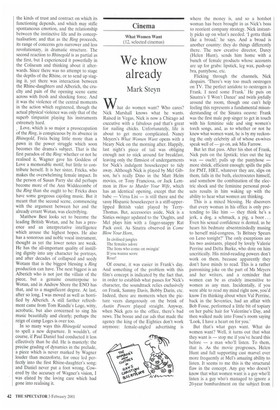We know already
Mark Steyn
What do women want? Who cares? Nick Marshall knows what he wants. Raised in Vegas, Nick is now a Chicago ad executive with a fabulous pad that's great for nailing chicks. Unfortunately, life is about to get more complicated. Nancy Meyers's What Women Want opens with a bleary Nick on the morning after. Happily, last night's piece of tail was obliging enough not to stick around for breakfast, leaving only the flimsiest of undergarments for Nick's indulgent housekeeper to tidy away. Although Nick is played by Mel Gibson, he's really Dino in the Matt Helm movies, or Tony Franciosa, or Jack Lemmon in How to Murder Your Wife, which has an identical opening, except that the babe — Virna Lisi — is still there and the sassy Hispanic housekeeper is a stiff-upperlipped British valet played by TerryThomas. But, accessories aside, Nick is a Sixties swinger updated to the 'Oughts, and Mel plays him with a finger-snappy Rat Pack cool. As Sinatra observed in Come Blow Your Horn,
In civilised jungles The females adore The lions who come on swingin' If you wanna score Roar!
Of course, it was easier in Frank's day. And something of the problem with this film's concept is indicated by the fact that, in order to establish what passes for Nick's character, the soundtrack relies exclusively on Frank, Sammy Davis, Bobby Darin, etc. Indeed, there are moments when the picture veers dangerously on the brink of Austin Powers played straight. Anyway, when Nick gets to the office, there's bad news. The booze and car ads that made the agency the king of the Eighties don't work anymore: female-angled advertising is
where the money is, and so a hotshot woman has been brought in as Nick's boss to reorient company strategy. Nick instantly picks up on what's needed. 'I gotta think like a broad,' he says. And a broad is another country: they do things differently there. The new creative director, Darcy (Helen Hunt), sends him home with a bunch of female products whose accounts are up for grabs: lipstick, leg wax, push-up bra, pantyhose, etc.
Flicking through the channels, Nick despairs. 'There's way too much oestrogen on TV. The perfect antidote to oestrogen is Frank. I need some Frank.' He puts on Sinatra's 'I Won't Dance' and twirls joyfully around the room, though one can't help feeling this represents a fundamental misunderstanding of the Sinatra oeuvre: Frank was the first male pop singer to get in touch with his feminine side and sing women's torch songs, and, as to whether or not he knew what women want, he is by my reckoning the only celebrity all of whose ex-wives speak well of — go on, ask Mia Farrow.
But let that pass. After his shot of Frank, Nick puts on the lipstick; tries out the leg wax — ouch!; pulls up the pantyhose — more shtick, efficient enough; spills the pills for PMT, HRT, whatever they are, slips on them, falls in the bath, electrocutes himself, and somehow the combination of the electric shock and the feminine personal products results in him waking up with the ability to hear what women are thinking.
This is a mixed blessing. He discovers that every woman in his office is only pretending to like him — they think he's a jerk, a dog, a schmuck, a pig, a boor ... Even his sexual confidence is dented, as he hears his bedmate absentmindedly musing to herself mid-congress, 'Is Britney Spears on Leno tonight?' The only exceptions are his two assistants, played by lovely Valerie Perrine and Delta Burke, who dote on him uncritically. His mind-reading powers don't work on them, because apparently they don't have minds to read. This is a rather patronising joke on the part of Ms Meyers and her writers, and a reminder that women can be as crudely insensitive to women as any man. Incidentally, if you were able to read my mind right now, you'd know I'm thinking about when Val Perrine, back in the Seventies, had an affair with Bob Fosse, performed a little bit of topiary on her pubic hair for Valentine's Day, and then walked nude into Fosse's room saying 'Look, I have a heart on for you.'
But that's what guys want. What do women want? Well, it turns out that what they want is — stop me if you've heard this before — a man who'll listen. To them, that is. As the movie progresses, Helen Hunt and full supporting cast marvel ever more frequently at Mel's amazing ability to listen. It seems to me this is the structural flaw in the concept. Any guy who doesn't know that what women want is a guy who'll listen is a guy who's managed to ignore a 20-year bombardment on the subject from chick flicks, Oprah, radio phone-ins — in which case he's probably clinically deaf, not merely chauvinist. Even us clapped-out old sexists have got hep to the listening angle. It's painless enough: just nod sympathetically every now and again, and lie back and think of England. The 2001 equivalents of those Sixties swingers are the hordes of guys out every night faking listening to the way women fake orgasm.
So the surprising thing about What. Women Want is how little they want. Nonetheless, Nick embarks on the inevitable transformation into a born-again feminist, and the equally inevitable realisation that he's falling for Darcy. In the traditional male-makeover sex comedy, Rock Hudson would be reformed by the steely determination of Doris Day. But here Mel Gibson's miscast leading lady is little more than a bundle of insecurities: What Women Want really wants is a strong woman's role to go mano a mono with Mel, Instead, the somewhat programmatic script just delivers him from one setpiece scene to another, letting the central romance fall a little flat.
Still, in his first romantic comedy, Mel gives a masterful performance, full of wonderful touches: I like the way, as he passes his female colleagues and hears how they despise him, just a flicker of hurt crosses his face. But that's another oddity: the uncomplicated chauvinist pussyhound Nick seems far more of a rounded character than the sensitive listening Nick. When you compare the buoyancy of his 'I Won't Dance' dance to his new-man smooch with Helen Hunt, you can't help noticing that Mel's character seems far deeper when he's shallow and at his shallowest when he's being deep. This may be a useful insight if Ms Meyers wants to make a sequel about What Men Want.



























































 Previous page
Previous page